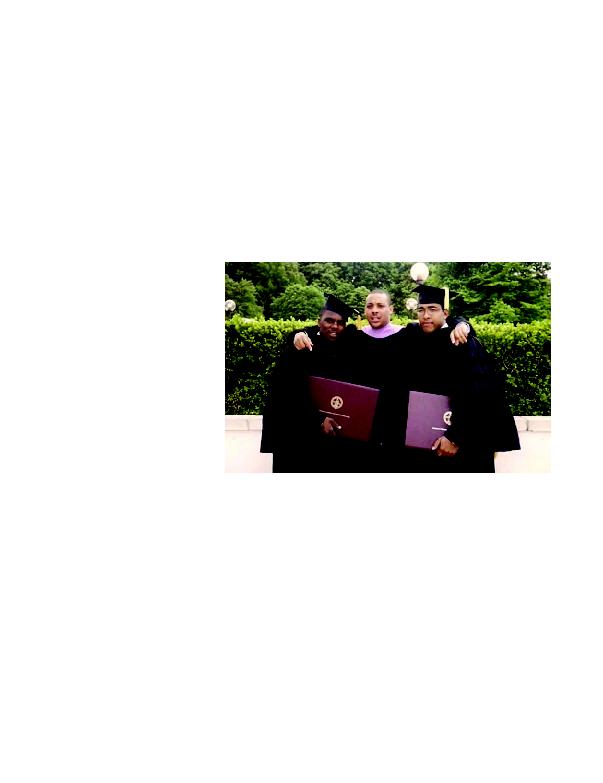
view of an inner-city emergency medicine physician.
take their work seriously. We were caught in the middle of a
significant division: you could get beaten up for making the
honor roll."
they were spotted by a teacher who sent them to listen to a
presentation by a recruiter from Seton Hall
University. "I felt like the recruiter was
describing me," says Dr. Hunt.
The three friends had previously talked
about going to college, but with a little nudg-
ing, he got the others to join him in swearing
to graduate from high school and college and
then complete medical school. Knowing that
three together would be stronger than one
alone, they promised to serve as one anoth-
er's mentors, providing advice, support, and
the motivation to succeed. By the end of sen-
ior year, all were headed for the Pre-
Medical/Pre-Dental Plus Program at Seton
Hall University--with Rameck Hunt turning down admission
at Howard University to stay close to his friends.
money to take the class to see plays. She built in them a love
for Shakespeare and gave the children a dream. She promised
that their environment would be only temporary if they used
their education to succeed in a profession. "Without her, I
might not have recognized that the world had more to offer
than what I knew," he says.
boy's mother sent him to correct his "crooked teeth," Dr.
Jenkins says. "Every time I'd see him, he'd tell me how smart
I was. He always gave me books to take home and read. `If
you use these books,' he'd say, `you can succeed.' Then, at the
next appointment, he'd quiz me about teeth and bones."
when he was in Newark and Dr. Hunt and Dr. Davis were
doing clinical rotations on the medical school's Camden cam-
pus. With differently timed courses, they could exchange text-
books and provide mutual academic support. They rallied
one another through any issue that might derail the pact: not
only academic challenges, but also family and girlfriend prob-
lems, or economic and financial concerns.
when they needed it. Dr. Davis says he honed his study strate-
gies in his first year of medical school. He formed a tight bond
with his dissection team in gross anatomy and stayed close to
the group throughout the four years of medical school. When
mony, he found an older student to teach him how to tie it.
selor Betty Oglesby for guidance. "Dr. [David] Seiden was the
smartest guy, a true instructor, and Dr. [Pamela] Champe con-
nected with all the students. There were a lot of open doors,
and you could knock on any one of them, any time."
Same sirens and gunshots ringing in my ears while I was
studying," he says. "I kept myself motivated, and I made it,
but it was never lost on me that my experiences need to be
mined, turned into something."